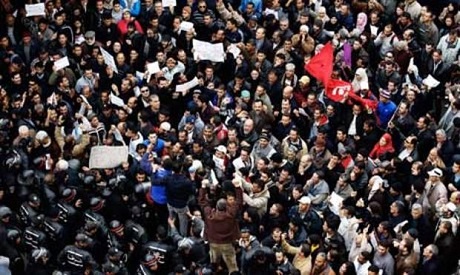
Mohamed Bouazizi's self-immolation more than 3 years ago, triggered by dispute with a police officer, has sparked mass protests and revolutions across the Arab world (Photo: Reuters)
Tunisians gathered Tuesday at the birthplace of the Arab Spring to vent their anger at social exclusion three years after a street vendor burned himself to death in what became an iconic protest.
The self-immolation of 26-year-old Mohammed Bouazizi in the impoverished central town of Sidi Bouzid on December 17, 2011 unleashed a wave of protest across the North African country.
His tragic act, aimed at attracting attention to economic hardship and repression, was the fuse for uprisings across the region that toppled veteran strongmen in Egypt, Libya and Yemen.
But three years on, unemployment in Tunisia remains stuck at 15 percent, with little prospect of improvement as the country remains gripped by political crisis.
Pro-reform activists who organised the Sidi Bouzid protest jointly with the powerful UGTT trade union confederation have called for a peaceful demonstration.
"Tuesday will be a day of rage and protests against the policies of the government which did not keep to its word and betrayed the promises of the revolution," said activist Youssef Jlili.
Demonstrators are also to pay tribute to two opposition politicians who were killed this year by suspected jihadists, triggering calls for the resignation of the Islamist-led government.
The murders plunged Tunisia into a deep political crisis which began to ease in October when the ruling Islamists and the mainly secular opposition struck a hard-won agreement to form an interim government of independents pending fresh elections.
And after months of wrangling, Tunisia's political parties agreed Saturday to choose Industry Minister Mehdi Jomaa to head a government of independent figures tasked with organising elections in 2014.
But the protracted crisis and resulting economic malaise has led organisers of Tuesday's events to insist President Moncef Marzouki, parliament chief Mustapha Ben Jaafar and Prime Minister Ali Larayedh are not welcome in Sidi Bouzid.
"We categorically refuse their presence... because they have done nothing but impoverish our region. They are not credible," said UGTT official Lazhar Ghmoudi.
Jomaa was chosen a day after a previous pick for premier agreed on by the outgoing government and the opposition, Mustapha Filali, 92, ruled himself out due to his age.
The ruling Islamist party Ennahda has led the coalition government since Tunisia held its first freely contested elections in October 2011.
The Sidi Bouzid region is home to nearly half a million people and its unemployment rate is the nation's highest at 24.4 percent.
"Three years have gone by and nothing changed. The social and economic situation is still difficult and the region has plunged into misery," activist Mondher Chaibi said ahead of the demonstration.
The opposition accuses the outgoing government of failing to rein in Islamist militants, who stepped up attacks during its period in power, and of failing to address the economic problems that triggered the 2010-11 uprising.
Ansar al-Sharia, a banned jihadist group designated a "terrorist organisation" by the authorities, has called for a demonstration on Tuesday in the historic Kasbah district in the heart of Tunis.
The authorities, who accuse Ansar al-Sharia of being behind the killings of opposition leaders Chokri Belaid and Mohammed Brahmi in February and July, have yet to respond to the call.
Ansar al-Sharia denies responsibility for the murders.
Short link: